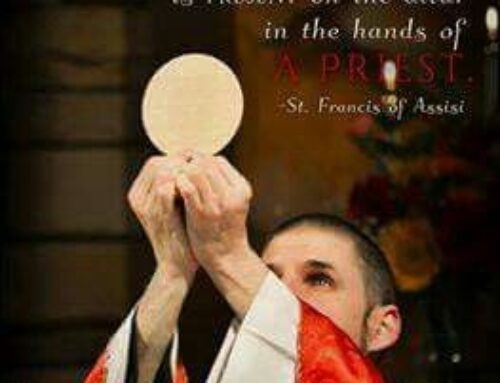(This article originally appeared in the TAU-USA Summer 2024 Digital Issue #112)
by Fr. John De La Riva, OFM Cap.
President-in-turn, National Conference of Spiritual Assistants
 I write to you as I am gazing on a nicely framed picture depicting the familiar portrayal of St. Francis embracing our crucified Lord Jesus. In an irresistible bond of loving gaze and opened armed embrace, the “little poor man” is drawn into the love of the “God-man.” This mystical encounter is set within the imagery of Calvary. It is a setting that calls to mind the exclamation of St. Paul when he says, “as for me life is Christ and him Crucified.” This statement expresses an understanding of the means and purpose, that St. Paul, St. Francis, and each Christian must embrace if we are to “live on” in the love of the Savior.
I write to you as I am gazing on a nicely framed picture depicting the familiar portrayal of St. Francis embracing our crucified Lord Jesus. In an irresistible bond of loving gaze and opened armed embrace, the “little poor man” is drawn into the love of the “God-man.” This mystical encounter is set within the imagery of Calvary. It is a setting that calls to mind the exclamation of St. Paul when he says, “as for me life is Christ and him Crucified.” This statement expresses an understanding of the means and purpose, that St. Paul, St. Francis, and each Christian must embrace if we are to “live on” in the love of the Savior.
A general focal point of theme for the articles of this TAU-USA issue is “WE ARE LOVE.” As for myself (and perhaps for you), this declaration is exhilarating, and at the same time, intimidating as it draws us to recall that we are “earthen vessels” that God providentially designs to be the home of His indwelling love. “WE ARE LOVE” draws me to identify qualities of God’s love that transform and perfect our love to a higher love. I see our Christian love being incarnational – an indwelling, sacrificial, and life-giving oblation.
It is in the truth of Christ’s divine initiative, like the figurative arm (unrestrained by the nail of cross) that Jesus extends to St. Francis, that we all find our ability to persevere in hope and love beyond any burden of our imperfections. The first letter of John reminds and encourages us when it states: “We love because He loved us first.” Yes, this gift of Divine love not only defuses any debilitating scrutiny of unworthiness, but ignites a bold confidence of self-donation in love. And so, like St. Francis, we can increasingly open wide our hearts in mutual embrace with Christ.
How often do we take time to ponder and to relish the action of Christ’s love engaging and embracing us? It is in this ever-clearer self-awareness that is born of the Spirit that we are set afire with a love that is fruitful whether we are in stillness of presence or obvious in action.
The Franciscan family is easily inspired to new heights of devotion by the fiery exclamation of St. Francis when he said: “My God and My All!” To strive to be whole and holy is the most natural and supernatural of desires and strivings for the follower of Christ. The freedom of sanctifying grace, time and again, will enable us to be unimpeded by moment of fault so to continually arise in greater integrity and generosity of love.
As I reflected on the theme statement: “WE ARE LOVE,” I thought it necessitates an on-going choice of will – NOW, in the present moment, to conform to the Will of God who is love. This declaration demands by its integrity, that we do not “rest on the laurels” of what we were in love nor rest content with the presumption of what we will be in love. On the contrary, we plant our feet so to speak in an intentional present moment of commitment to set our gaze on what stands before us in person and circumstance and say “yes” to love as we are loved by God. Let us remember that what we want to be, we should do (now), and what we do, we will become.
What is the scope for this “Being” love? We know well the fundamental call to “love God with your whole mind, heart, and soul, and to love your neighbor as yourself.” The Letter of St. James warns us to remember that “to say we love God yet to hate our neighbor makes us liars.” There is no true love of God if it betrays a love of neighbor. Oh, the challenge we can find in our brother or sister (and ourselves). We can easily recall our Lord instructing us that we are called to a greater love: A love that reaches beyond that of family and friend (“for even the pagan loves those who love them”) on toward the enemy and persecutor. The sacrifice and cross of true love await us all to beckon and encourage us to trust the many means and ways of its presence – to open our hearts, with a bold abandon, to the dictates of the Holy Spirit.
Considering the necessity of our love being freely sacrificial, in an oblation of self for the “other,” I recalled a spiritual counsel from a Franciscan Tertiary of the 18th century, named St. Benedict Joseph Labre. St. Benedict was of noble birth but chose an itinerant life of voluntary poverty – a beggar who made the streets of Rome, Italy, his pilgrim way of silent prayer, fasting, and penance. Although known to seldom speak, when he did, it was worth the hearing.
He was asked one day how our love should be to achieve sanctity and his reply was: “To properly love, one must have three hearts. The first must be a heart of fire toward God so as to think and speak only of God, accepting hardships with demands by its integrity, that we do not “rest on the laurels” of what we were in love nor rest content with the presumption of what we will be in love. On the contrary, we plant our feet so to speak in an intentional present moment of commitment to set our gaze on what stands before us in person and circumstance and say “yes” to love as we are loved by God. Let us remember that what we want to be, we should do (now), and what we do, we will become.
What is the scope for this “Being” love? We know well the fundamental call to “love God with your whole mind, heart, and soul, and to love your neighbor as yourself.” The Letter of St. James warns us to remember that “to say we love God yet to hate our neighbor makes us liars.” There is no true love of God if it betrays a love of neighbor. Oh, the challenge we can find in our brother or sister (and ourselves). We can easily recall our Lord instructing us that we are called to a greater love: A love that reaches beyond that of family and friend (“for even the pagan loves those who love them”) on toward the enemy and persecutor. The sacrifice and cross of true love await us all to beckon and encourage us to trust the many means and ways of its presence – to open our hearts, with a bold abandon, to the dictates of the Holy Spirit.
Considering the necessity of our love being freely sacrificial, in an oblation of self for the “other,” I recalled a spiritual counsel from a Franciscan Tertiary of the 18th century, named St. Benedict Joseph Labre. St. Benedict was of noble birth but chose an itinerant life of voluntary poverty – a beggar who made the streets of Rome, Italy, his pilgrim way of silent prayer, fasting, and penance. Although known to seldom speak, when he did, it was worth the hearing.
He was asked one day how our love should be to achieve sanctity and his reply was: “To properly love, one must have three hearts. The first must be a heart of fire toward God so as to think and speak only of God, accepting hardships with resignation, and to submit in everything to His holy will. The second must be a heart of flesh, toward our neighbor, that will move us to help him in all his needs by instruction, advice and prayer; to have compassion for the poor sinners and for the souls in purgatory so that the Lord will grant them eternal rest. The third must be a heart of bronze toward oneself, that will make us hate all kinds of sensuality, resist self-love without rest, mortify the body, and subdue the wicked tendencies of perverted nature. With these three hearts love makes us deserving of the reward of the life to come.”
Looking once again upon the devotional picture of St. Francis and our Crucified Lord, both with arms outstretched in mutual embrace, I am comforted and encouraged to answer the call to be love. For this Calvary setting which the world associates with humiliation, suffering, weakness and defeat, rather reminds the Christian of the power of love for the other, a love that can sow the seeds of new life from the blood of selfless sacrifice and self-donation. This greater love is not the stuff of dream or fantasy. This love is the light that casts out the darkness of our imperfect and broken world. It is here and now at the crossroads of our life with each other that our Lord seeks to dwell in love.




Leave A Comment